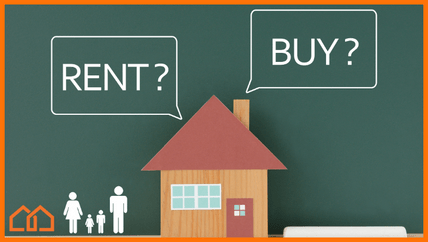The Advantages of Renting a House
In this complicated real estate landscape, high interest rates meeting high home prices are pushing many would-be homeowners out of the market. This means that these people will need to live in rental properties as they make their next steps. Even if homebuying is in your future goals, there are some benefits of renting that you can take advantage of.
Today we will break down the pros and cons of renting a house.

The Advantages of Renting a Home
1. You get the freedom to move and “sample” different areas.
Homeownership means that you must plant roots, staying in the same area for at least a few years (as you pay down your house and build equity). However, renters have the freedom to find a new house or apartment in a different area at the end of each lease. If you’re in a transitional season of your life, then this freedom is a major benefit over getting a new home.
2. You aren’t responsible for maintenance costs and upgrades.
If your lease states that your landlord is responsible for any and all repairs, you are only responsible for your security deposits and monthly rent payments. All that expensive upkeep and renovations that homeowners have to do are not on your plate. Talk about freedom from hassle!

3. Unlike down payments, you can get your security deposit back.
When you buy a home, you pay a down payment, which is usually 3-20% of the home’s value. This, along with the earnest money deposit (1-3% of the home’s value), and other closing costs, go toward your home purchase.
This amounts to a lot of money upfront. Though you do gain plenty of financial benefits, these upfront costs can be too much when you’re simply not ready to commit. Alternatively, you can get your security deposit back after your lease ends.
4. You get time to work on your credit score.
If you’re interested in the housing market but need more time to improve your financial profile, renting offers an opportunity to establish a history of consistent payment. In the meantime, start talking with a lender to figure out what you need to do in the short-term and long term to get your financial profile where it needs to be.
5. You usually don’t pay property taxes.
Most of the time, rental payments don’t include property taxes. Your landlord typically pays the property taxes associated with the real property you rent. That’s thousands saved over the years. Always check your rental terms to make sure you are not responsible for these fees, and if you are paying them, know you can write them off during tax time.
6. If your neighbor is not the best, you can move!
Ah, the final perk of renting. Rental neighbors are never permanent. There are plenty of options in the rental market and you can move away instead of making your apartment a forever home.

The Disadvantages of Renting a House
As with everything, there is a downside. Here are the cons of renting a home.
1. You don’t earn equity.
While property values typically appreciate over time, giving you home equity as a financial backup, rentals do not offer the same advantage. This can be the biggest disadvantage to renting.
2. You don’t have full control of your living situation.
When you own a home, you are free to paint your walls hot pink and install shag carpet to your heart’s content. But when you rent, you don’t have as much freedom to decorate. Sure, you can paint, though you’ll have to cover it again before moving, and installing flooring is usually a no-go. Hands down, if you want freedom to control your living space, become a property owner.
3. Utility costs can be out of your control.
In some lease agreements, utility bills like heating, cooling, and trash are split as an average among all tenants in the community, while other optional utilities like internet are under your control. This is more common with apartment complexes. Anyways, this can be frustrating if you’re naturally a low consumer of energy and you get a higher energy bill due to neighbors running their heat up high during the winter.
4. Rent goes up while monthly mortgage payments stay the same (if fixed).
Rent goes up with market value while a fixed-rate mortgage must stay the same according to the established amortization schedule. If you have aggressive financial goals, rent increases can make them more challenging to achieve.
5. You don’t get as many tax benefits as a homeowner.
While renters do get their fair share of kickbacks from the IRS, homeowners definitely come on top. Tax deductions like mortgage interest is a major one. However, know that you can still write off a home office as a renter, as well as real estate tax if your landlord includes that in your monthly payment.
Advantages of Renting a House
Renting is a great living situation for residents who want flexibility, to build their financial profile, and to not worry about tedious upkeep. It’s also a reliable way to get safe housing in areas that you want to explore. If you’re an American looking for a rental for the upcoming chapter of your life, check out our list of available rental homes.
We’re also here to chat about homeownership. It’s never too early to start preparing, and you can speak with one of our real estate pros to get a rundown of what to do to be ready to buy a home. We work with plenty of first-time homebuyers, so ask away! In particular, we specialize in new construction homes, which offer the best bang for your buck right now.


